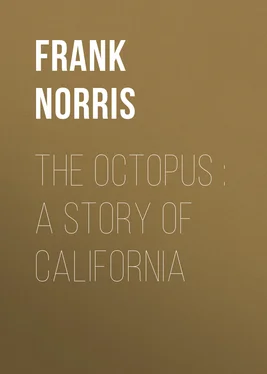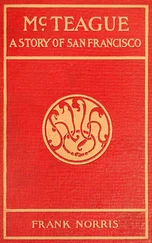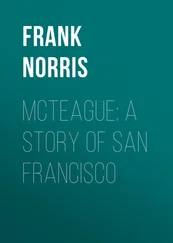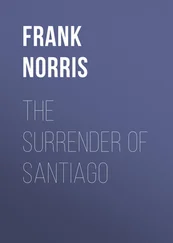Frank Norris - The Octopus - A Story of California
Здесь есть возможность читать онлайн «Frank Norris - The Octopus - A Story of California» — ознакомительный отрывок электронной книги совершенно бесплатно, а после прочтения отрывка купить полную версию. В некоторых случаях можно слушать аудио, скачать через торрент в формате fb2 и присутствует краткое содержание. Жанр: foreign_prose, literature_19, foreign_antique, на английском языке. Описание произведения, (предисловие) а так же отзывы посетителей доступны на портале библиотеки ЛибКат.
- Название:The Octopus : A Story of California
- Автор:
- Жанр:
- Год:неизвестен
- ISBN:нет данных
- Рейтинг книги:5 / 5. Голосов: 1
-
Избранное:Добавить в избранное
- Отзывы:
-
Ваша оценка:
- 100
- 1
- 2
- 3
- 4
- 5
The Octopus : A Story of California: краткое содержание, описание и аннотация
Предлагаем к чтению аннотацию, описание, краткое содержание или предисловие (зависит от того, что написал сам автор книги «The Octopus : A Story of California»). Если вы не нашли необходимую информацию о книге — напишите в комментариях, мы постараемся отыскать её.
The Octopus : A Story of California — читать онлайн ознакомительный отрывок
Ниже представлен текст книги, разбитый по страницам. Система сохранения места последней прочитанной страницы, позволяет с удобством читать онлайн бесплатно книгу «The Octopus : A Story of California», без необходимости каждый раз заново искать на чём Вы остановились. Поставьте закладку, и сможете в любой момент перейти на страницу, на которой закончили чтение.
Интервал:
Закладка:
It was, no doubt, Vanamee’s talk that had stimulated him to this point. The story of the Long Trail, with its desert and mountain, its cliff-dwellers, its Aztec ruins, its colour, movement, and romance, filled his mind with picture after picture. The epic defiled before his vision like a pageant. Once more, he shot a glance about him, as if in search of the inspiration, and this time he all but found it. He rose to his feet, looking out and off below him.
As from a pinnacle, Presley, from where he now stood, dominated the entire country. The sun had begun to set, everything in the range of his vision was overlaid with a sheen of gold.
First, close at hand, it was the Seed ranch, carpeting the little hollow behind the Mission with a spread of greens, some dark, some vivid, some pale almost to yellowness. Beyond that was the Mission itself, its venerable campanile, in whose arches hung the Spanish King’s bells, already glowing ruddy in the sunset. Farther on, he could make out Annixter’s ranch house, marked by the skeleton-like tower of the artesian well, and, a little farther to the east, the huddled, tiled roofs of Guadalajara. Far to the west and north, he saw Bonneville very plain, and the dome of the courthouse, a purple silhouette against the glare of the sky. Other points detached themselves, swimming in a golden mist, projecting blue shadows far before them; the mammoth live-oak by Hooven’s, towering superb and magnificent; the line of eucalyptus trees, behind which he knew was the Los Muertos ranch house—his home; the watering-tank, the great iron-hooped tower of wood that stood at the joining of the Lower Road and the County Road; the long wind-break of poplar trees and the white walls of Caraher’s saloon on the County Road.
But all this seemed to be only foreground, a mere array of accessories—a mass of irrelevant details. Beyond Annixter’s, beyond Guadalajara, beyond the Lower Road, beyond Broderson Creek, on to the south and west, infinite, illimitable, stretching out there under the sheen of the sunset forever and forever, flat, vast, unbroken, a huge scroll, unrolling between the horizons, spread the great stretches of the ranch of Los Muertos, bare of crops, shaved close in the recent harvest. Near at hand were hills, but on that far southern horizon only the curve of the great earth itself checked the view. Adjoining Los Muertos, and widening to the west, opened the Broderson ranch. The Osterman ranch to the northwest carried on the great sweep of landscape; ranch after ranch. Then, as the imagination itself expanded under the stimulus of that measureless range of vision, even those great ranches resolved themselves into mere foreground, mere accessories, irrelevant details. Beyond the fine line of the horizons, over the curve of the globe, the shoulder of the earth, were other ranches, equally vast, and beyond these, others, and beyond these, still others, the immensities multiplying, lengthening out vaster and vaster. The whole gigantic sweep of the San Joaquin expanded, Titanic, before the eye of the mind, flagellated with heat, quivering and shimmering under the sun’s red eye. At long intervals, a faint breath of wind out of the south passed slowly over the levels of the baked and empty earth, accentuating the silence, marking off the stillness. It seemed to exhale from the land itself, a prolonged sigh as of deep fatigue. It was the season after the harvest, and the great earth, the mother, after its period of reproduction, its pains of labour, delivered of the fruit of its loins, slept the sleep of exhaustion, the infinite repose of the colossus, benignant, eternal, strong, the nourisher of nations, the feeder of an entire world. Ha! there it was, his epic, his inspiration, his West, his thundering progression of hexameters. A sudden uplift, a sense of exhilaration, of physical exaltation appeared abruptly to sweep Presley from his feet. As from a point high above the world, he seemed to dominate a universe, a whole order of things. He was dizzied, stunned, stupefied, his morbid supersensitive mind reeling, drunk with the intoxication of mere immensity. Stupendous ideas for which there were no names drove headlong through his brain. Terrible, formless shapes, vague figures, gigantic, monstrous, distorted, whirled at a gallop through his imagination.
He started homeward, still in his dream, descending from the hill, emerging from the canyon, and took the short cut straight across the Quien Sabe ranch, leaving Guadalajara far to his left. He tramped steadily on through the wheat stubble, walking fast, his head in a whirl.
Never had he so nearly grasped his inspiration as at that moment on the hilltop. Even now, though the sunset was fading, though the wide reach of valley was shut from sight, it still kept him company. Now the details came thronging back—the component parts of his poem, the signs and symbols of the West. It was there, close at hand, he had been in touch with it all day. It was in the centenarian’s vividly coloured reminiscences—De La Cuesta, holding his grant from the Spanish crown, with his power of life and death; the romance of his marriage; the white horse with its pillion of red leather and silver bridle mountings; the bull-fights in the Plaza; the gifts of gold dust, and horses and tallow. It was in Vanamee’s strange history, the tragedy of his love; Angele Varian, with her marvellous loveliness; the Egyptian fulness of her lips, the perplexing upward slant of her violet eyes, bizarre, oriental; her white forehead made three cornered by her plaits of gold hair; the mystery of the Other; her death at the moment of her child’s birth. It was in Vanamee’s flight into the wilderness; the story of the Long Trail, the sunsets behind the altar-like mesas, the baking desolation of the deserts; the strenuous, fierce life of forgotten towns, down there, far off, lost below the horizons of the southwest; the sonorous music of unfamiliar names—Quijotoa, Uintah, Sonora, Laredo, Uncompahgre. It was in the Mission, with its cracked bells, its decaying walls, its venerable sun dial, its fountain and old garden, and in the Mission Fathers themselves, the priests, the padres, planting the first wheat and oil and wine to produce the elements of the Sacrament—a trinity of great industries, taking their rise in a religious rite.
Abruptly, as if in confirmation, Presley heard the sound of a bell from the direction of the Mission itself. It was the de Profundis, a note of the Old World; of the ancient regime, an echo from the hillsides of mediaeval Europe, sounding there in this new land, unfamiliar and strange at this end-of-the-century time.
By now, however, it was dark. Presley hurried forward. He came to the line fence of the Quien Sabe ranch. Everything was very still. The stars were all out. There was not a sound other than the de Profundis, still sounding from very far away. At long intervals the great earth sighed dreamily in its sleep. All about, the feeling of absolute peace and quiet and security and untroubled happiness and content seemed descending from the stars like a benediction. The beauty of his poem, its idyl, came to him like a caress; that alone had been lacking. It was that, perhaps, which had left it hitherto incomplete. At last he was to grasp his song in all its entity. But suddenly there was an interruption. Presley had climbed the fence at the limit of the Quien Sabe ranch. Beyond was Los Muertos, but between the two ran the railroad. He had only time to jump back upon the embankment when, with a quivering of all the earth, a locomotive, single, unattached, shot by him with a roar, filling the air with the reek of hot oil, vomiting smoke and sparks; its enormous eye, cyclopean, red, throwing a glare far in advance, shooting by in a sudden crash of confused thunder; filling the night with the terrific clamour of its iron hoofs.
Читать дальшеИнтервал:
Закладка:
Похожие книги на «The Octopus : A Story of California»
Представляем Вашему вниманию похожие книги на «The Octopus : A Story of California» списком для выбора. Мы отобрали схожую по названию и смыслу литературу в надежде предоставить читателям больше вариантов отыскать новые, интересные, ещё непрочитанные произведения.
Обсуждение, отзывы о книге «The Octopus : A Story of California» и просто собственные мнения читателей. Оставьте ваши комментарии, напишите, что Вы думаете о произведении, его смысле или главных героях. Укажите что конкретно понравилось, а что нет, и почему Вы так считаете.












